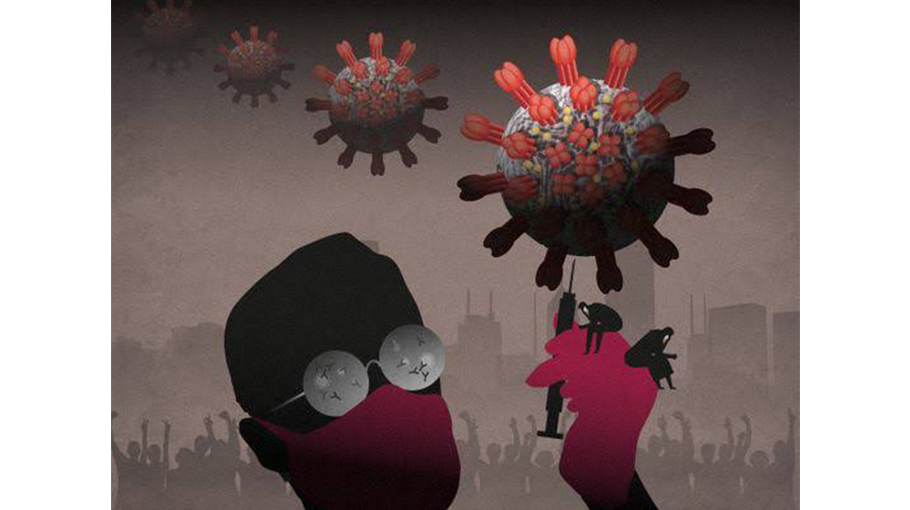Omicron: India must not lower its guard
A problem in India is the lack of vaccines to choose from to mix and match for a booster

The other day I was on a flight from Hyderabad to Delhi. It was packed. The gentleman sitting next to me didn’t have his mask on. I was uncomfortable, so I gestured to the cabin crew to request him to wear it. India’s rules clearly say masks on planes are compulsory. My co passenger put his mask on for a while but removed it shortly thereafter. That’s when I asked him put it back on. “But do you think this really helps?”, he asked me as he sheepishly put the mask on again.
And there in lies the problem.
Lowering the guard
For months now, India has been fortunate to have had a low number of Covid cases. As the economy opened up, people started socialising, partying and tried to lead as normal a life as possible. I don’t blame them. The second Delta wave in April devastated all of us. We wanted to feel human again. But there has also been a shockingly casual approach to basic precautions like wearing masks indoors.
A family member posted videos of a Delhi wedding that took place last week, with hundreds of people packed into a large tent, dancing away with no masks. I could only spot one man in the video with a face covering.
And now the Omicron variant is upon us. As I write this column, the government of India has announced a big jump in Omicron cases in India — India’s Omicron Covid count rose to 126 on Saturday after Karnataka and Kerala reported six and four cases respectively, while three more persons in Maharashtra also tested positive for the variant.
According to central and state officials, Omicron cases have been detected in 11 states and union territories — Maharashtra (43), Delhi (22), Rajasthan (17) and Karnataka (14), Telangana (8), Gujarat (7), Kerala (11), Andhra Pradesh (1), Chandigarh (1), Tamil Nadu (1) and West Bengal (1). Delhi’s cases have steadily climbed from about 30 odd a day to 45 on Wednesday, 57 on Thursday and 85 on Friday.
As we are seeing now in the UK, US and Europe, it doesn’t take long for cases to massively jump with this variant. India’s health ministry has a grim projection — that based on the progression of the strain in the UK, India’s could see a massive 14 lakh cases everyday.
Avoiding mass gathering
A worried health ministry has now advised people to avoid all non essential travel and mass gatherings. The question is — are we ready for Omicron?
The government says India is administering vaccines at the highest rate in the world. Currently about 39 per cent of India’s population is fully vaccinated while nearly 60 per cent have had one shot. While other countries are pushing hard for people to get a booster shot, in India there continues to be a bizarre silence from the government on this, except to say “the science is being studied”. Across the world there has been enough evidence in public domain now that 3 shots, not 2, will significantly help in warding off severe disease.
The World Health Organisation says Omicron is probably
in most countries now. So far, most cases have been mild but
doctors warn that as it spreads,
hospitalisations will go up.
So are we really ready?
Gagandeep Kang, senior virologist at the Christian Medical College Vellore was among those who wanted to wait on a booster shot initially.
She now points out that evidence shows two doses of AstraZeneca (Covishield) and of the mRNA vaccines like Pfizer and Modena on their own are simply not enough and we must think about boosters now. She says the decision needs to be taken “fast” and administered to the immunocompromised first followed by the elderly and then health care workers.
Lack of choice
Doctors say one problem in India is the lack of vaccines to choose from to mix and match for a booster. For some reason, India has not got Pfizer and Moderna, getting stuck over indemnity clauses. Gangandeep Kang says she had hoped these approvals would have come through.
Data in the UK shows two doses of Covishield topped up with an mRNA vaccine result in 71% effectiveness against Omicron.
The World Health Organisation says Omicron is probably in most countries now. So far, most cases have been mild but doctors warn that as it spreads, hospitalisations will go up. So are we really ready? I hope so. But irresponsible behaviour by people could soon land us in big trouble.
Nidhi Razdan is an award-winning journalist. She was the Executive Editor of NDTV. She has reported on Indian politics
and diplomacy.
Source: Gulf New




